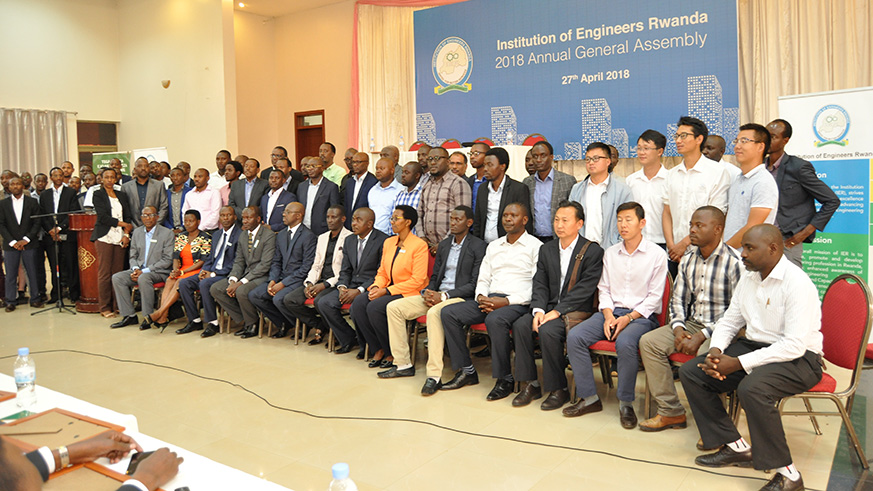

On the closure of the 15th National retreat, a total of 13 resolutions were reached and recommended for immediate action by and or through the respective implementing agencies.
During the retreat, leaders committed among others to strengthening the functioning of existing professional bodies focusing on strategies aimed at recruiting certified professionals and scaling up this practice in all professions.
The Institution of Engineers Rwanda (IER), for some time now has been working on consolidating strategies aimed at ensuring that only certified professional engineers are employed and that practitioners in the engineering profession in Rwanda comply with established engineering service delivery standards.
The New Times’ Joseph Mudingu had a one-on-one with the Executive Secretary of the Institution about history of the Institution and what it is doing in promoting the engineering profession and how it’s working on improving quality and efficiency of services.
Back ground
The professional body started in 2008 as a learned society of engineering professionals with an aim of promoting and developing engineering services and best practice for sustainable development of our country.
All these proved difficult to be achieved without an appropriate legal framework until 2012 when the law No. 26/2012 of 29th June 2012 was established and enacted by the Parliament to regulate the activities of all those practicing engineering profession in the County.
The law that governs engineering profession
The Institution is working to streamline engineering profession in the Country in accordance with the above mentioned law.
Article 2 of the law defines an engineer as a person who holds the required academic qualifications and who is a registered member of the Institution of Engineers Rwanda.
Article 6 of the same law states that for a person to be authorized to practice engineering profession in Rwanda, whether a local or a foreign professional, among other requirements, he or she must be registered with the Institution of Engineers Rwanda.
Also article 38 of the law states that, "any person who practices engineering profession without being registered on the roll of the Institution of Engineers Rwanda, shall be punished in accordance with Rwandan criminal law”
"People should understand here that the law governs the profession of engineering and it regulates everybody practicing engineering profession whether in public or private Institutions and companies. Anyone who practices the profession outside the law is doing it illegally and should be punished in accordance with the Rwandan criminal law”
The Institution of Engineers is working to establish clear working modalities with regulatory and other agencies to ensure that practitioners in the engineering profession in the Country adhere to the law and comply with established engineering service delivery standards.
What the Institution is doing
The institution has a mission to ensure that clients of its members rightfully maintain trust in the engineering profession and that no one is allowed to practice as an engineer if he or she is not registered with IER. The mandate of IER is hinged on the following three main pillars;
To raise awareness of the engineering profession in the Country to ensure that its importance and value in the Country’s social – economic development process is well understood and appreciated at all levels of Rwandan society.
To guide and to regulate the activities of all those practicing engineering profession in the Country to ensure that engineering services delivered conform to and are in compliance with established engineering standards of service delivery and best practices.
To enhance technical capacities and professional competencies of its members to enable them become more competent and competitive in the national, regional and international engineering job markets
The strategic plan
In order to achieve its mandate, the leadership of the Institution deemed it imperative to review and update IER Strategic Plan and ensure that the revised Strategic Plan is fully aligned to its mandate and provides a clear framework for implementing all strategic and operational activities that seek to promote values and basic practices of the engineering profession in Rwanda. The 2018-2022 Strategic Plan for the Institution was therefore, developed taking into consideration the imperatives to fulfill its mandate as highlighted above and addressing the current institutional, organizational and human resource capacity gaps that are likely to constrain implementation of planned activities and slow down the process of achieving development outcomes envisaged in the Strategic Plan.
Therefore, the leadership of the Institution has clearly articulated the vision, mission, core values and key strategic objectives to guide the Institution to achieve its mandate in the next five years.
The Institution of Engineers Rwanda is calling upon its partners and stakeholders who include public, private and civil society institutions and organizations to support the process of promoting and developing engineering profession in the country to be able to achieve the desired economic transformation and sustainable social-economic development.


